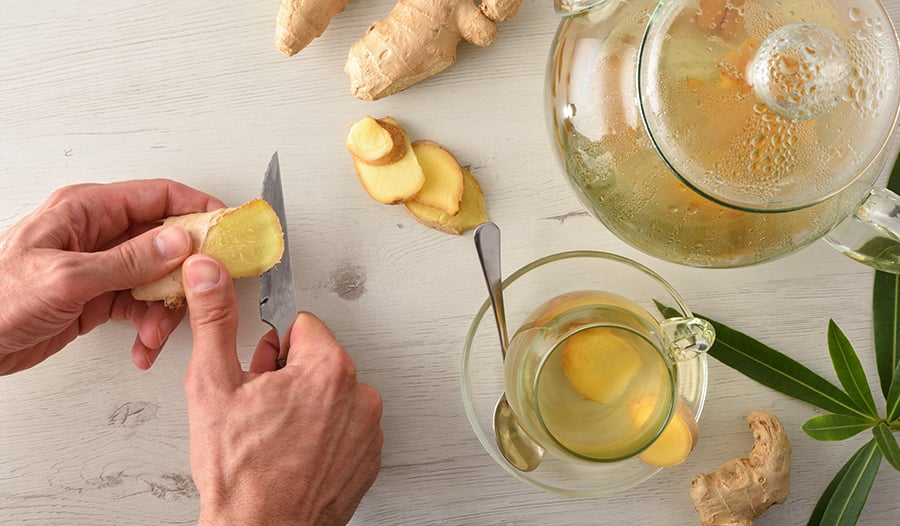Improve Digestion With 7 Simple Tips and Herbs

When your digestion is thriving, your body systems are able to work synergistically. Nutrients are absorbed, energy flows, metabolism stays on point, and toxins get the boot. Plus, a happy gut with a healthy microbiome isn’t just about smooth digestion—it’s your immunity’s best friend, your brain’s secret weapon, and your mood’s cheerleader.
Ready to show your gut some love?
This article will share simple and effective tips to help you optimize digestion, nourish your body, and support radiant health from the inside out.
Understanding Digestive Health
Your entire digestive system works together as a team. From the moment food enters your mouth to when it exits, your body is working overtime to break down food, extract nutrients, and keep everything running smoothly.
When your digestive system is in tip-top shape, you feel energized and your immune system stays strong. But when something’s off—bloating, constipation, or abdominal discomfort—it’s a signal from your body that you are out of balance.
Factors like nutrition habits, lifestyle, and stress can throw your system out of whack. That’s why staying hydrated, eating a balanced diet that includes healthy fiber from fruits and vegetables, and finding ways to manage stress is key. Treat your body well with healthy habits, and your gut returns the favor.
Why The Microbiome Matters
At the heart of digestive health lies the gut microbiome, a bustling community of good and bad bacteria. These tiny microorganisms are your body’s behind-the-scenes heroes, breaking down food, helping you absorb nutrients, and supporting your immune system.
When your gut bacteria are living in harmony, everything clicks. But when they’re out of balance (aka dysbiosis), the ripple effects can lead to digestive struggles like poor nutrient absorption, sluggish digestion, and discomfort after meals.
The fix? Feed your gut what it needs: probiotics, prebiotics, and a diverse diet full of whole, nutrient-rich foods. If you want to go the extra mile, a high-quality probiotic supplement can help keep your gut bacteria thriving.
How To Improve Digestion: Step-By-Step Guide
1. Relax Before You Eat
Digestion starts long before you even take your first bite. Your mental state plays a massive role in how well your body processes food, and no one digests well in fight or flight mode.
How to Change Your Energy for Better Digestion:
- Set the Tone: Sit at a real table (you know, not your desk or car). Turn off distractions like your phone or TV. A calm environment tells your brain to shift gears and prep for digestion.
- Activate Rest-and-Digest Mode: Slow down. Take a moment to chill and take a few deep breaths. When you’re calm, your parasympathetic nervous system—the hero of digestion—kicks in.
2. Chew More, Digest Easily
Chewing: the low-key MVP of digestion. Sure, it seems simple, but when you slow down and chew your food thoroughly, you set the stage for smoother digestion and better nutrient absorption.
Why Chewing Deserves More Love:
- Smaller Food, Bigger Impact: Your teeth break food into bite-sized pieces, making life easier for your stomach and intestines.
- Enzyme Boost: Chewing triggers saliva production, and your saliva comes loaded with enzymes like amylase to start breaking down carbs.
- Feel Full, Not Stuffed: Chewing slowly gives your brain a chance to catch up and feel satiated.
3. Feed Your Gut the Right Way
Your gastrointestinal tract isn’t just an organ—it’s home to billions of microorganisms that make your digestive system work like a well-oiled machine. Feed these friendly microbes well, and they’ll reward you with better digestion and stronger immunity.
How to Keep Your Gut Microbiome Thriving:
- Probiotic Foods: Fermented goodies like yogurt, kimchi, and sauerkraut bring in the good bacteria your gut loves.
- High-Fiber Foods: Fruits, veggies, whole grains, and legumes are prebiotic gold—they feed those good bacteria so they can do their job.
- Mix It Up: A diverse diet keeps different strains of gut bacteria happy, creating a thriving microbiome.
4. Stay Hydrated for Smooth Digestion
Staying hydrated ensures your digestive system runs smoothly—literally.
Hydration Tips for Happy Digestion:
- Water Wins: Sip water throughout the day. The classic "8x8 rule" (eight 8-ounce glasses) is a good starting point but adjust based on activity, living at altitude, and other individual needs.
- Skip the Sugar Bombs: Sugary drinks and sodas can mess with your gut bacteria. Stick with water and herbal teas.
- Time It Right: Drink water before meals to help prep your stomach. Avoid chugging during meals, though, as it can slow digestion.
5. Drop Habits That Harm Your Gut Health
Sometimes the best way to improve your digestion isn’t about adding—it’s about subtracting. Certain habits sneakily sabotage your gut health, so kicking them to the curb can make all the difference.
Gut-Offending Habits to Ditch:
- Artificial Sweeteners: Sweeteners like aspartame might be calorie-free, but studies suggest they can mess with your gut bacteria.
- Too Much Alcohol: Alcohol can irritate your gut lining and wipe out beneficial bacteria.
- Late-Night Meals: Big dinners right before bed? Not your gut’s best friend. Lying down too soon can lead to indigestion and acid imbalance.
- Overuse of Medications: Antibiotics, NSAIDs (like ibuprofen), and antacids can disrupt your gut microbiome when used excessively.
6. Move Your Body, Support Digestion
Need even more motivation to exercise? Movement isn’t just for burning calories—it keeps your gut humming along happily.
Easy Ways to Add Movement to Your Day:
- Post-Meal Walks: A 15-minute stroll after eating helps stimulate peristalsis (fancy word for gut contractions that move food along).
- Gentle Workouts: Yoga, especially poses like Cat-Cow or Seated Twist, massages your digestive organs and encourages flow.
- Stay Active Daily: Even light activities like gardening or dancing in your kitchen can support a healthy digestive rhythm.
The bottom line? A little movement goes a long way in keeping your digestion smooth and stress-free.
7. Incorporate Herbal Remedies for Digestion
When it comes to herbal allies, nature has several effective options. Certain herbs and spices are digestive superheroes, helping to soothe, cleanse, and support your gut in the most natural way possible. Herbal medicines have been used for centuries to promote digestive health and alleviate abdominal discomfort.
Herbs to Keep in Your Digestive Toolkit:
- Ginger Root: A long-time favorite for easing nausea and bloating, ginger supports digestion and nutrient absorption.
- Peppermint: Widely consumed for its digestive benefits, peppermint tea calms the stomach and alleviates discomfort after meals.
- Fennel: May aid with digestion and relieve gassiness.
- Catnip: Mild relaxant that calms the stomach and soothes discomfort.
Brew these herbs into teas or ingest them as a fast-acting liquid herbal tincture for a tasty, natural way to boost your digestive and gastrointestinal health. These herbs can support healthy digestion and manage chronic gastrointestinal discomforts.
Takeaway
Your digestive health can be a gateway to vibrant energy, a strong immune system, and a balanced mind. By adopting small, consistent changes—like chewing more, hydrating well, and adding herbs to your routine—you can give your gut the love it deserves.
Ready to unlock your best digestion yet? Start with these tips and let herbs be your trusted allies. Your gut (and your entire body) will thank you!
References:
- Mayer EA, Tillisch K, Gupta A. Gut/brain axis and the microbiota. J Clin Invest. 2015;125(3):926-938.
- Quigley EM. Gut microbiota and the role of probiotics in therapy. Curr Opin Pharmacol. 2011;11(6):593-603.
- Singh N, Denning DW, Kapoor R, et al. The clinical role of prebiotics and probiotics in improving digestion and gut health. Curr Top Med Chem. 2015;15(1):1-10.
- Smeets AJ, Westerterp-Plantenga MS. The acute effects of a meal on energy intake and hunger are affected by chewing more. Appetite. 2008;51(3):693-696.
- Mertz W, Young VR. Tryptophan requirements and metabolism: 50 years of research and controversy. J Nutr. 2006;136(6 Suppl):1476S-1482S.
- Rao SS, Lu C, Schulze-Delrieu K. The influence of water on gastrointestinal transit. Am J Clin Nutr. 1998;68(3):750-756.
- Stevens MJ, Ross C, Newman P, et al. Peppermint oil in functional gastrointestinal disorders. Evid Based Complement Alternat Med. 2008;5(3):295-301.
- Ginger ML. Ginger root: Phytochemistry and clinical evidence of its efficacy. Crit Rev Food Sci Nutr. 2014;54(2):171-185.
- Böhn L, Störsrud S, Simrén M. Nutrient absorption and the effects of dietary fiber on gut health. Gastroenterol Clin North Am. 2010;39(2):385-399.
- Young SN. Role of lifestyle factors in digestive health. J Physiol. 2012;590(Pt 9):2401-2411.
DISCLAIMER:This Wellness Hub does not intend to provide diagnosis...
















































































 Table of Contents
Table of Contents


